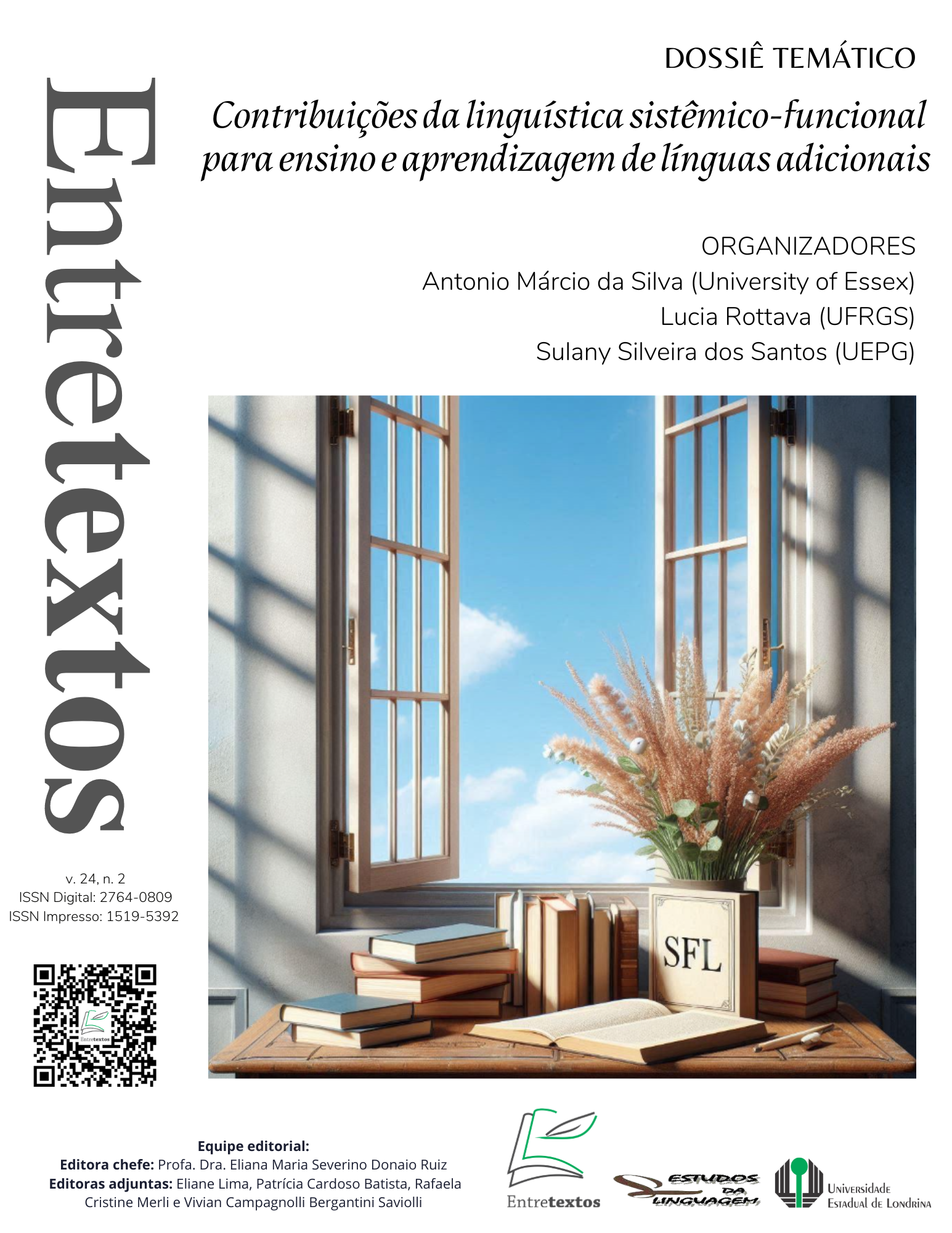Wine Tasting: Description of a Technical-Scientific Genre from a Systemic-Functional Perspective
DOI:
https://doi.org/10.5433/1519-5392.2024v24n2p71-94Keywords:
technical-scientific genres, semantic-discursive systems, Spanish language teachingAbstract
This article presents the analysis of prototypical texts from the genre of technical wine tasting. The study described in this text is part of a Research-Action project titled "Teaching Spanish in a Technological Context: A Methodological Reflection Guided by the LSF Genre Pedagogy." Its purpose is to reflect on the teaching and learning of Spanish as a Foreign Language (E/LE) at a Federal Institute and to produce educational materials guided by systemic Genre Pedagogy for this context. During the implementation phase of this research, it was necessary to describe this genre in order to plan pedagogical tasks. To achieve this, theoretical and analytical principles from two semantic-discursive systems were mobilized: Periodicity and Ideation (Martin and Rose, 2007/2008; Martin, 1992; Rose and Martin, 2018). In this regard, six textual instances were linguistically and discursively analyzed to identify the realization of their schematic structure, i.e., their stages and constituent phases. The results confirmed that the purpose of technical wine tastings is to evaluate and that this social practice consists of five stages (contextualization, product description, evaluation, harmonization, and farewell) and nine possible phases. These data are essential for creating educational materials that effectively support the teaching of E/LE in technological environments.
Downloads
References
FIGUEREDO, G. Introdução ao perfil metafuncional do português brasileiro: contribuições para os estudos multilíngues. 2011. Tese de doutorado (Doutorado em Letras) - Universidade Federal de Minas Gerais (UFMG), Belo Horizonte, 2011. Disponível em: https://repositorio.ufmg.br/handle/1843/DAJR-8GLS6E . Acesso em 2 mar 2022
HALLIDAY, M. A. K. Language as a social semiotic: The social interpretation of language and meaning. London: Edward Arnol, 1978.
HALLIDAY, M. A. K. Hacia una teoría del aprendizaje basada en el lenguaje. Linguistics and Education, v. 5, n.2, p. 93-116, 1993. Disponível em: https://doi.org/10.1016/0898-5898(93)90026-7 Acesso em 5 jun. 2020. DOI: https://doi.org/10.1016/0898-5898(93)90026-7
HALLIDAY, M. A. K. On language in relation to the evolution of human consciousness. In: Sture Allen (ed.) Of thoughts and words (Proceedings of Nobel Symposium 92: The relation between language and mind). Imperial College Press, 1994.
HALLIDAY, M.A.K. Sobre la arquitectura del lenguaje humano. On language and linguistics. Collected works of M.A.K. Halliday. Continuum, n.3, 2003, p. 1-29, 2003.
HALLIDAY, M. A. K. Una mirada retrospectiva sobre la LSF y la alfabetización. In: WHITTAKER, Rachel; O'DONNELL, Mick; MCCABE, Anne (orgs.) Language and literacy: Functional approaches. Continuum, 2006, páginas 15-44.
HALLIDAY, M. A. K.; MATTHIESSEN. C. M. An Introduction to Functional Grammar. 4. ed. London: Arnold, a member of the Hodder Headline Group, 2014. DOI: https://doi.org/10.4324/9780203783771
MARTIN, J. R. English Text: System and Structure. Amsterdam: Benjamins, 1992. DOI: https://doi.org/10.1075/z.59
MARTIN, J. R. (org.). Developing Theory: A Handbook in Appliable Linguistics and Semiotics. London: Bloomsbury, 2002
MARTIN, J.R. Boomer dreaming: the texture of recolonisation in a lifestyle magazine. En Forey, G. & Thompson, G. (Eds) Text-type and Texture, London, UK: Equinox Publishing, 2009, p.252-284.
MARTIN, J. R. Discourse semantics. In: G. Thompson, W. Boucher, L. Fontaine & J.Y. Liang (eds.) The Cambridge Handbook of Systemic Functional Linguistics. Cambridge: Cambridge University Press, 2019, p. 358-381. DOI: https://doi.org/10.1017/9781316337936.016
MARTIN, J.R.; ROSE, D. Genre Relations: Mapping Culture. London: Equinox, 2007/2008. 281 p.
MIELE, A.; RIZZON, L.A.; ANDRADE, C. Avaliação nacional de vinhos - safra 2000: características sensoriais e físico-químicas dos vinhos. Bento Gonçalves: Embrapa Uva e Vinho, 2000. 8p. (Embrapa Uva e Vinho. Comunicado Tecnico, 36).
NONEMACHER, T. M. Gêneros instanciados em textos da área de edificações em contexto de Ensino Médio Técnico: mapeamento e análise sistêmico-funcional dos sistemas de ideação e de periodicidade. 2019. Tese de Doutora. (Doutorado em Letras) - Universidade Federal do Rio Grande do Sul, Porto Alegre, 2019.
ROSE, D. Democratizing the classroom: a literacy pedagogy for the new generation. Journal of Education, v. 37, n. 1, p. 131-167, 2005. Disponível em: https://hdl.handle.net/10520/AJA0259479X_158. Acesso em 10 de mar de 2024
ROSE, D. Designing pedagogic registers: Reading to Learn. In: CADWELL, D.; KNOZ, J.;
ROSE, D.; MARTIN, J. R. Leer para aprender: lectura y escritura en las áreas del
currículo. Madrid: Ediciones Pirámide, 2018.
THIOLLENT, M. J. Ma. Metodologia da Pesquisa-ação. 2. ed. São Paulo: Cortez, 1986.
THOMPSON, Geoff. Introducing functional grammar. 3 ed. New York: Routledge-Taylor & Francis Group. 2014. DOI: https://doi.org/10.4324/9780203785270
Downloads
Published
How to Cite
Issue
Section
License
Copyright (c) 2024 Michele Mafessoni de Almeida

This work is licensed under a Creative Commons Attribution 4.0 International License.
Entretextos adota a Licença Creative Commons Attribution 4.0 International, portanto, os direitos autorais relativos aos artigos publicados são do/s autor/es.
Sob essa licença é possível: Compartilhar - copiar e redistribuir o material em qualquer suporte ou formato. Adaptar - remixar, transformar, e criar a partir do material, atribuindo o devido crédito e prover um link para a licença e indicar se mudanças foram feitas.























